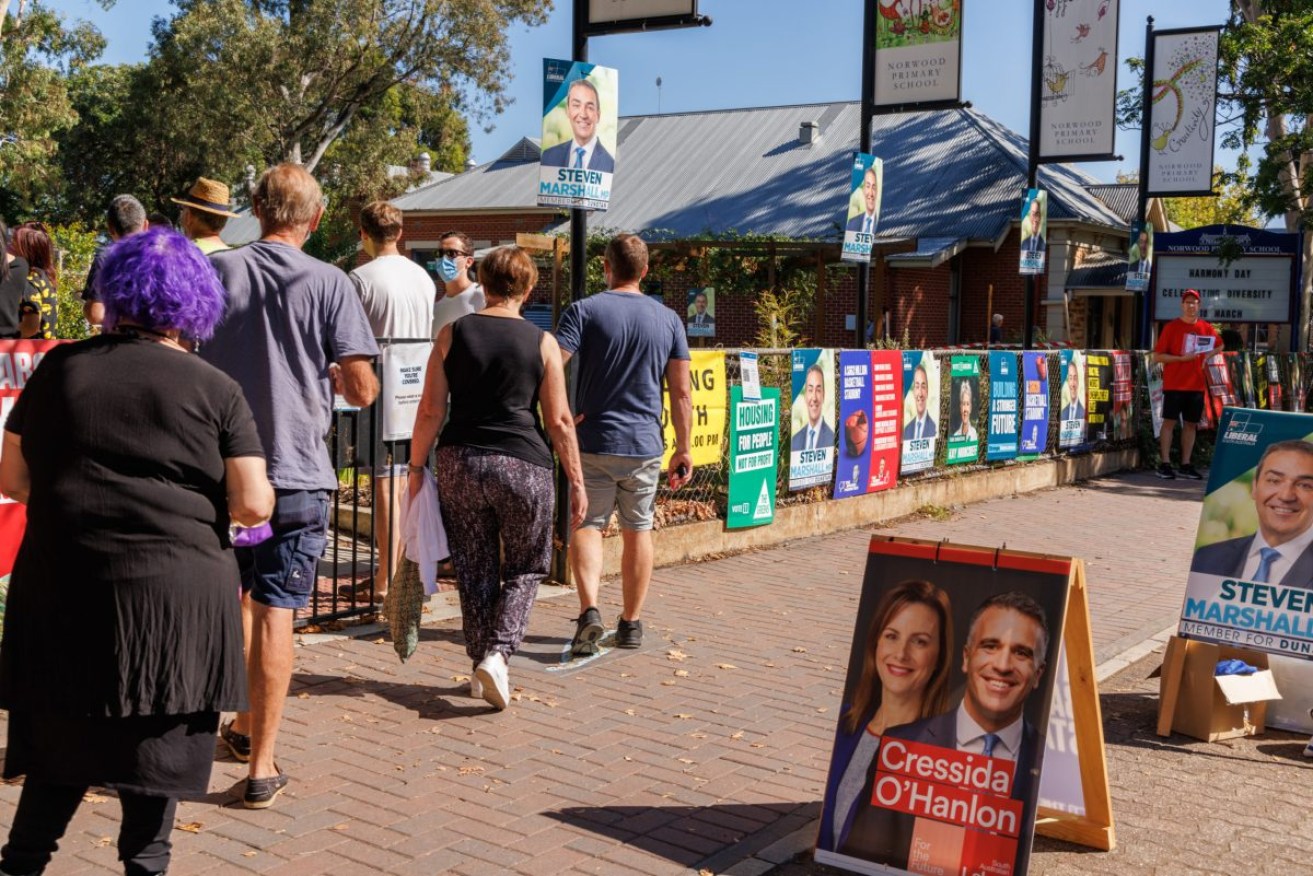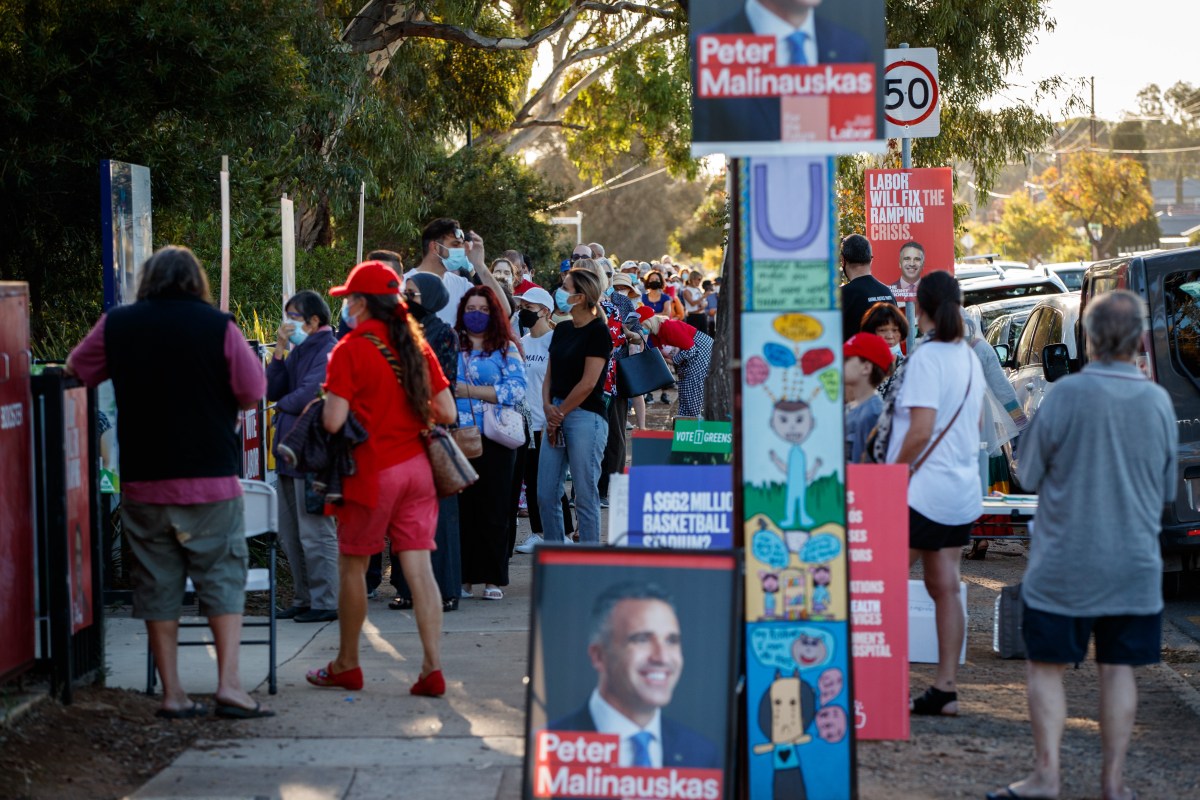COVID prompts blowout in SA poll wait times, non-voters
South Australian voters waited on average nearly twice as long to cast their ballot at last year’s state election than they did in 2018, with the pandemic also blamed for a surge of non-voters.


Photo: Tony Lewis/InDaily
Statistics from the Electoral Commission of South Australia (ECSA) show the average polling day wait time for the 2022 state election was 13.5 minutes, up from 8.4 minutes in 2018.
That’s despite ECSA anticipating fewer people would attend polling booths on election day due to an increasing number of pre-poll and postal votes.
The March 19 poll, held amidst a second wave of COVID-19 cases and concern over provisions for virus-affected voters, saw ECSA issue 84,419 failure to vote notices – an increase of nearly a third compared to 63,715 in 2018.
It’s also up from the 46,940 notices issued in 2014 and 44,100 in 2010.
The 2022 data, provided to parliament’s Budget and Finance Committee in September, shows 37,470 electors responded to their failure to vote notice.
“Conscientious objection” (5464 people) was the primary reason given for not voting, followed by “illness” (3542).
COVID-19, including “directed quarantine/isolation” and “COVID symptoms”, was cited by 3042 people as their reason for not voting.
ECSA also received 11,121 responses from people indicating they had already voted and received their notice by mistake.
The Commission is reviewing its practices at the 2022 state election, with a report to be tabled in parliament early this year with recommendations for reform.
ECSA director of communications James Trebilcock said the “major priority” for the Commission at last year’s state election “was ensuring every eligible elector who wanted to vote was able to vote safely”.
“ECSA recognises that there are always areas for improvement in the conduct of state elections,” he said in a statement today.
“As such, the Commission is currently undertaking significant analysis and developing recommendations for changes to the election process, including potential revisions to the Electoral Act, to ensure the efficiency and integrity of South Australian elections.
“The analysis and recommendations will be presented to Parliament and the public in the 2022 State Election Report later this year.”
In August 2022, electoral commissioner Mick Sherry said social distancing measures at polling booths was a key reason for the longer wait times.
“The bottom line is that to make people feel safe we had to put a number of measures in place,” he told the Budget and Finance Committee.
“When you normally come in to vote at a polling place you’ve got all these voting screens – you stand next to someone.
“To give that distance every second voting screen had to be turned around. What the impact of that was is we have now cut in half the amount of voting screens available within each polling place, so that’s the number one issue to be aware of.”

People lining up to vote at Woodville Gardens School on state election day last year. Photo: Matt Turner/AAP
He also said the Commission “had to comply with the density requirements within each polling place”.
“Whereas before… you might be able to have 100 people in there at any particular time, now you might be restricted to only 50,” he said.
“Those two issues have caused queues because people have come to vote and, next minute, we just can’t put the throughput into the polling place.”
According to ECSA, 18 per cent of all votes at the 2022 state election were pre-poll votes, compared to 10.8 per cent in 2018.
The percentage of postal votes also rose to 13.7 per cent in 2022 from 8 per cent in 2018.
However, Sherry wrote to the Budget and Finance Committee in September to express concern that “many” postal votes were not counted due to slow postal services.
“Consistent with previous state elections, for the 2022 State election, it was identified the current postal services are not capable of meeting the timeframes for postal voting stipulated by legislation resulting in many interstate and overseas electors postal vote not being included,” he wrote on September 21.
“Following the 2018 State Election, ECSA made recommendations in the Election Report to change legislation to resolve this issue. Unfortunately, the Bill was not passed by parliament.”
Voters who had COVID-19 and were forced to quarantine for 14 days were allowed to apply for a postal vote until Thursday, March 17, two days before the election.
After that, they had to register to collect a ballot pack from one of SA Health’s a rapid antigen test collection points.
According to ECSA’s data, 21,218 people registered to collect a ballot pack from a RAT collection point.
Of the 84,419 people sent failure to vote notices, ECSA issued $104 expiation notices to 47,614 electors, of which 37,146 were issued a further $68 fine for failing to respond a third time.
The 37,146 people to receive a third notice from ECSA is up from 27,942 in 2018.
More than 1.26 million people were registered to vote in the 2022 state election.




